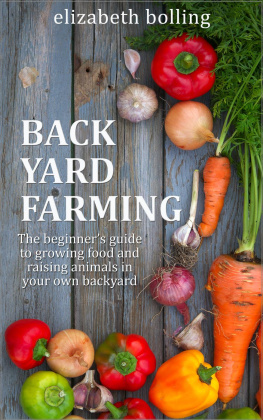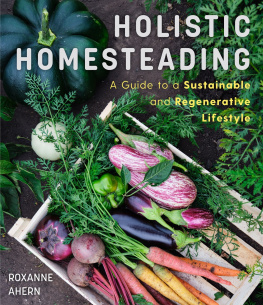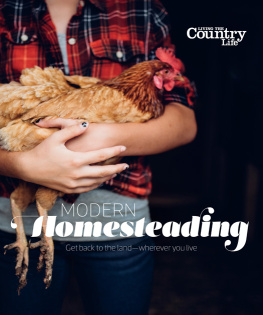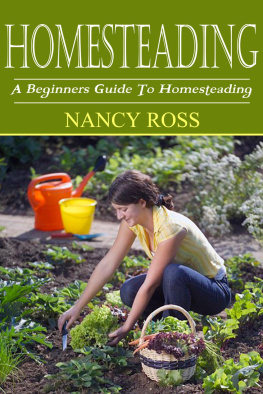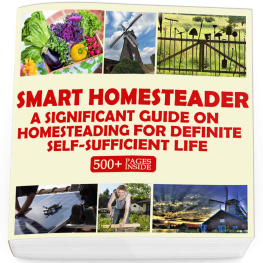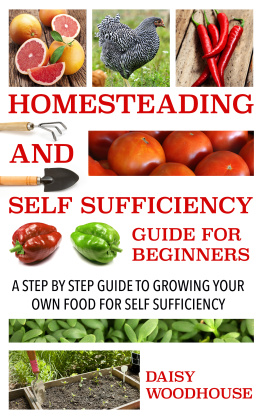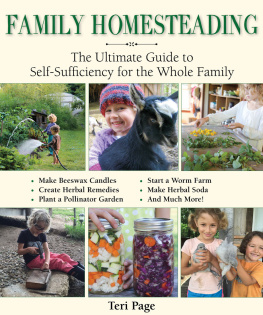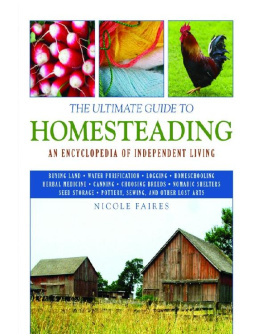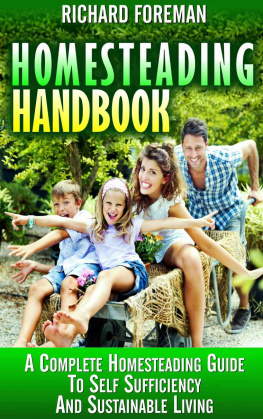Copyright 2017 by Steven Jones
All rights reserved. No part of this book may be reproduced in any manner without the express written consent of the publisher, except in the case of brief excerpts in critical reviews or articles. All inquiries should be addressed to Skyhorse Publishing, 307 West 36th Street, 11th Floor, New York, NY 10018.
Skyhorse Publishing books may be purchased in bulk at special discounts for sales promotion, corporate gifts, fund-raising, or educational purposes. Special editions can also be created to specifications. For details, contact the Special Sales Department, Skyhorse Publishing, 307 West 36th Street, 11th Floor, New York, NY 10018 or .
Skyhorse and Skyhorse Publishing are registered trademarks of Skyhorse Publishing, Inc., a Delaware corporation.
Visit our website at www.skyhorsepublishing.com.
10 9 8 7 6 5 4 3 2 1
Library of Congress Cataloging-in-Publication Data.
Names: Jones, Steven, 1976- author.
Title: Homesteading from scratch : building your self-sufficient homestead, start to finish / Steven Jones.
Description: New York : Skyhorse Publishing, [2017] | Includes bibliographical references and index.
Identifiers: LCCN 2016043115 | ISBN 9781510712904 (pbk. : alk. paper)
Subjects: LCSH: Agriculture. | Home economics, Rural. | Country life. | Urban homesteading.
Classification: LCC S501.2 .J66 2017 | DDC 635dc23
LC record available at https://lccn.loc.gov/2016043115
Cover design by Jane Sheppard
Cover photo credit: bottom row, Melissa Jones; top photo, iStock
Print ISBN: 978-1-5107-1290-4
Ebook ISBN: 978-1-5107-1294-2
Printed in China
Dedication
This book is dedicated to my wife, Melissa, and my children, Oliver and Hannah.
They are the only reason I do anything.
This book is also dedicated to the memory of my grandfather, Clyde Beck Jones, who I wish could have lived long enough to see it.
Contents
PREFACE
Homesteading From Scratch was designed to explore homesteading with readers who have no prior homesteading experience or knowledge.
This book is for people who want to do things differently. The type of people who want to eat real food, grow herbs, make cheese, raise baby animals, hunt mushrooms, pick blackberries, unschool their children, can jelly, ferment kraut, farm organically, connect to nature, live intentionally, and more.
Touching on farming, animal husbandry, home production, food preparation, and even homeschooling, Homesteading From Scratch allows readers to discover homesteading as a movement and as a lifestyle.
Inspired by From Scratch magazine, an online publication devoted to homesteading and intentional living, this book serves as a reference and also as a cheerleader for people who want a bit more control and responsibility over where their food comes from, the things they consume, and how they live their lives.
People like Katherine and Bobby Benoit, whove been homesteading for twelve years. They produce 80 percent of their own food and homeschool their seven children. Or Randall and Elizabeth Wescott Hewitt, who raise heritage pigs and cattle on their family property. Theres Tiffany Toler of the Cedar Roost who has been working to achieve her dream of creating an all-natural, organic hatchery. And then there are people like Tiffany Ketchum, whos trying to turn her green thumb and vegan lifestyle into a self-sufficient dream in her backyard while working on her degree and juggling life as a full-time mother of two gorgeous children.
Some of us, like Katherine and Bobby, have been living a self-sufficient life for a long time. Others, like Tiffany, have just begun exploring a homesteading lifestyle and developing a base skill set.
Thats whats really great about this movement. There are thousands of people who want to live a life close to the ground, and would love to work with you to develop even more of a community by sharing skills, knowledge, and ideas. Im blessed to be part of this group of people who are devoted to learning and passionate about their surroundings.
When we became homesteaders, my family and I made friends all over the world who are devoted to healing themselves, their families, and their communities through something as simple as learning to live a more intentional life through raising food, animals, and babies.
Hopefully, this book can serve as an aid to those people who just want to do things differently.
Thank you and enjoy!
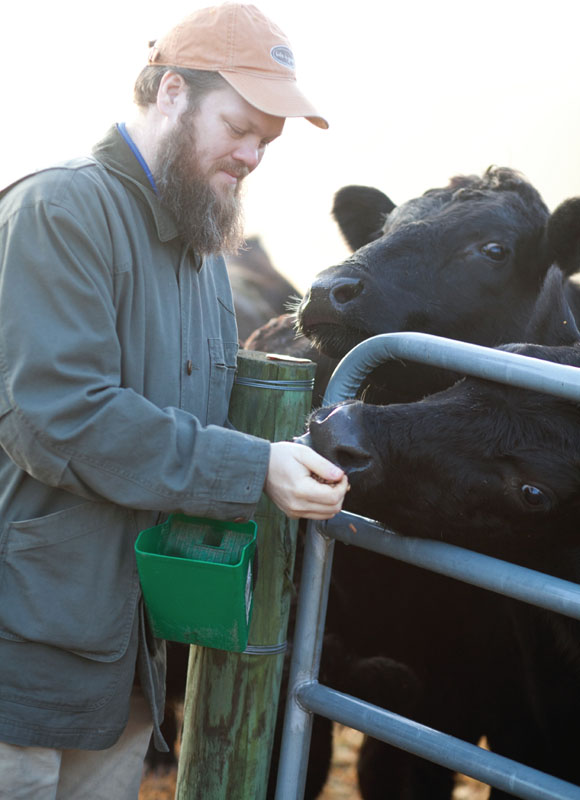
INTRODUCTION
My grandparents were born in Alabama in the 1920s, and both were children of sharecroppers. My grandfather, Clyde Beck Jones, always told us stories about growing up and how he started plowing fields with a mule at the age of thirteen. My grandmother, Inez Jones, beat him by a few years. She cannot remember how old she was, but she recalls having to stand on tiptoe to reach the handles of the plow.
They spent decades growing cotton, peanuts, and tobacco. They grew up in homes that were heated by wood, raised most of their food in home gardens and butchered their own animals whenever they needed meat.
They continued these habits well after they left farming to get jobs at the cotton mills. My grandmother kept a kitchen garden that spanned more than an acre and included fruit trees and blueberry bushes. Honestly, I believe the woman could spit on the red Alabama clay, throw down a seed, and produce enough food to feed a family of twelve, like some sort of Biblical miracle.
She froze, canned, and dried so much food, that even now, in her late eighties, shell probably have enough jars put up when she leaves this world (may it be a blessedly distant day) to feed a small army. This is despite the fact that she quit canning years ago.
In contrast, my parents worked in factories and in construction. They kept a small garden only sporadically. My mother occasionally made jelly and canned a few odds and ends; however, the rigors of raising four rambunctious children made the idea of going back to the land seem like something for people with a lot more spare time.
I vaguely remember hoeing in my grandmothers garden for the last time when I was fourteen. A surly teenager, I was unhappy about the whole experience.
I should have spent every spare second in my saintly grandmothers garden trying to absorb as much as I could while she was still healthy enough to show me. But I didnt.
Like many people, I grew up with only the vaguest of ideas about where my food came from. I grew up in rural Alabama, so I had a better idea than some, but despite my parents best efforts (my father once slaughtered and butchered a hog in my backyard) I knew (and know, if Im being honest) only the barest minimum about growing food and living off the land.
So, when I was in my late thirties, I started thinking about farming. Truthfully, it started off as a joke. I was leaving a job in television and wanted to get as far away as possible from working in media. I knew only a few things: I was tired of living in a suburban house I didnt want; I was tired of being in a job that involved nothing but a computer; and I was tired of working just to afford things I did not get to enjoy most of the time.
I like animals, and I like working with my hands, so the idea of doing something that involved both of those things appealed to me.



